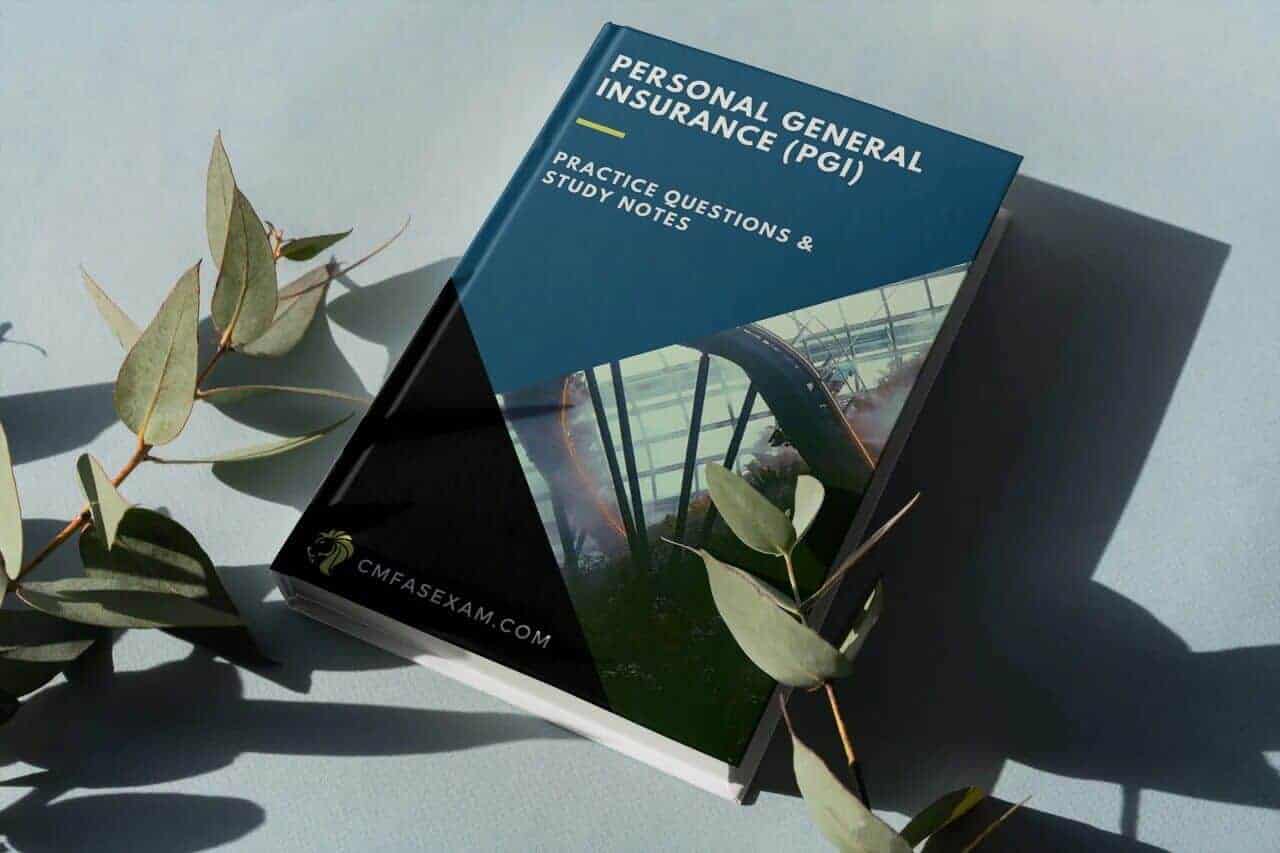CMFAS Personal General Insurance (PGI) Exam Free Trial
Let us do all the heavy works so that you can study efficiently.
Quiz-summary
0 of 30 questions completed
Questions:
- 1
- 2
- 3
- 4
- 5
- 6
- 7
- 8
- 9
- 10
- 11
- 12
- 13
- 14
- 15
- 16
- 17
- 18
- 19
- 20
- 21
- 22
- 23
- 24
- 25
- 26
- 27
- 28
- 29
- 30
Information
Chapter 6 Other Personal/Health Insurance
1. Introduction
2. Foreign Domestic Worker Insurance (FDWI)
You have already completed the quiz before. Hence you can not start it again.
Quiz is loading…
You must sign in or sign up to start the quiz.
You have to finish following quiz, to start this quiz:
Results
0 of 30 questions answered correctly
Your time:
Time has elapsed
You have reached 0 of 0 points, (0)
Categories
- Not categorized 0%
- 1
- 2
- 3
- 4
- 5
- 6
- 7
- 8
- 9
- 10
- 11
- 12
- 13
- 14
- 15
- 16
- 17
- 18
- 19
- 20
- 21
- 22
- 23
- 24
- 25
- 26
- 27
- 28
- 29
- 30
- Answered
- Review
-
Question 1 of 30
1. Question
What distinguishes an Investment-Linked Policy (ILP) from a traditional life insurance policy?
Correct
Explanation: An Investment-Linked Policy (ILP) distinguishes itself from traditional life insurance policies by combining life insurance coverage with investment components, allowing policyholders to allocate funds to investment-linked sub-funds.
Incorrect
Explanation: An Investment-Linked Policy (ILP) distinguishes itself from traditional life insurance policies by combining life insurance coverage with investment components, allowing policyholders to allocate funds to investment-linked sub-funds.
-
Question 2 of 30
2. Question
What is the primary purpose of the investment component in an Investment-Linked Policy (ILP)?
Correct
Explanation: The primary purpose of the investment component in an Investment-Linked Policy (ILP) is to offer investment growth and the potential for higher returns, allowing policyholders to participate in the performance of the underlying investment-linked sub-funds.
Incorrect
Explanation: The primary purpose of the investment component in an Investment-Linked Policy (ILP) is to offer investment growth and the potential for higher returns, allowing policyholders to participate in the performance of the underlying investment-linked sub-funds.
-
Question 3 of 30
3. Question
What is the significance of “units” in the context of Investment-Linked Policies (ILPs)?
Correct
Explanation: In the context of Investment-Linked Policies (ILPs), “units” denote the allocation of funds to specific investment-linked sub-funds, reflecting the policyholder’s investment choices within the ILP.
Incorrect
Explanation: In the context of Investment-Linked Policies (ILPs), “units” denote the allocation of funds to specific investment-linked sub-funds, reflecting the policyholder’s investment choices within the ILP.
-
Question 4 of 30
4. Question
What is the role of the fund manager in the management of Investment-Linked Policies (ILPs)?
Correct
Explanation: The role of the fund manager in the management of Investment-Linked Policies (ILPs) involves selecting and managing the investment-linked sub-funds offered within the ILPs, aiming to optimize the performance of the funds.
Incorrect
Explanation: The role of the fund manager in the management of Investment-Linked Policies (ILPs) involves selecting and managing the investment-linked sub-funds offered within the ILPs, aiming to optimize the performance of the funds.
-
Question 5 of 30
5. Question
What is the primary purpose of the “switching” feature in Investment-Linked Policies (ILPs)?
Correct
Explanation: The primary purpose of the “switching” feature in Investment-Linked Policies (ILPs) is to enable policyholders to reallocate funds among different investment-linked sub-funds, allowing flexibility in investment choices.
Incorrect
Explanation: The primary purpose of the “switching” feature in Investment-Linked Policies (ILPs) is to enable policyholders to reallocate funds among different investment-linked sub-funds, allowing flexibility in investment choices.
-
Question 6 of 30
6. Question
What is the primary purpose of Foreign Domestic Worker Insurance (FDWI) in Singapore?
Correct
Explanation: The primary purpose of Foreign Domestic Worker Insurance (FDWI) in Singapore is to offer financial protection to employers against medical expenses incurred by their foreign domestic workers, in compliance with the Work Injury Compensation Act.
Incorrect
Explanation: The primary purpose of Foreign Domestic Worker Insurance (FDWI) in Singapore is to offer financial protection to employers against medical expenses incurred by their foreign domestic workers, in compliance with the Work Injury Compensation Act.
-
Question 7 of 30
7. Question
What are the key components typically covered by Foreign Domestic Worker Insurance (FDWI) in Singapore?
Correct
Explanation: Foreign Domestic Worker Insurance (FDWI) in Singapore typically covers key components such as hospitalization and surgical expenses, outpatient medical treatment, and personal accident benefits to ensure the well-being of foreign domestic workers.
Incorrect
Explanation: Foreign Domestic Worker Insurance (FDWI) in Singapore typically covers key components such as hospitalization and surgical expenses, outpatient medical treatment, and personal accident benefits to ensure the well-being of foreign domestic workers.
-
Question 8 of 30
8. Question
What is the role of the employer with regard to Foreign Domestic Worker Insurance (FDWI) in Singapore?
Correct
Explanation: In Singapore, employers are responsible for purchasing and maintaining Foreign Domestic Worker Insurance (FDWI) for their foreign domestic workers, ensuring that the workers are covered for medical expenses and personal accident benefits.
Incorrect
Explanation: In Singapore, employers are responsible for purchasing and maintaining Foreign Domestic Worker Insurance (FDWI) for their foreign domestic workers, ensuring that the workers are covered for medical expenses and personal accident benefits.
-
Question 9 of 30
9. Question
What is the significance of the Security Bond and Personal Accident Insurance (PAI) in the context of Foreign Domestic Worker Insurance (FDWI) in Singapore?
Correct
Explanation: In the context of Foreign Domestic Worker Insurance (FDWI) in Singapore, the Security Bond serves as a financial guarantee by employers to ensure the proper conduct of their foreign domestic workers, while Personal Accident Insurance (PAI) provides coverage for accidental injuries of the workers.
Incorrect
Explanation: In the context of Foreign Domestic Worker Insurance (FDWI) in Singapore, the Security Bond serves as a financial guarantee by employers to ensure the proper conduct of their foreign domestic workers, while Personal Accident Insurance (PAI) provides coverage for accidental injuries of the workers.
-
Question 10 of 30
10. Question
What is the purpose of the Work Injury Compensation Act (WICA) in relation to Foreign Domestic Worker Insurance (FDWI) in Singapore?
Correct
Explanation: The Work Injury Compensation Act (WICA) in Singapore regulates the insurance coverage and compensation for work-related injuries or illnesses of foreign domestic workers, ensuring that employers provide adequate protection for their workers.
Incorrect
Explanation: The Work Injury Compensation Act (WICA) in Singapore regulates the insurance coverage and compensation for work-related injuries or illnesses of foreign domestic workers, ensuring that employers provide adequate protection for their workers.
-
Question 11 of 30
11. Question
What is the primary purpose of a health insurance policy’s “co-payment” provision?
Correct
Explanation: The primary purpose of a health insurance policy’s “co-payment” provision is to establish the minimum amount the insured individual must pay for covered medical expenses, representing a cost-sharing arrangement between the insured individual and the insurer.
Incorrect
Explanation: The primary purpose of a health insurance policy’s “co-payment” provision is to establish the minimum amount the insured individual must pay for covered medical expenses, representing a cost-sharing arrangement between the insured individual and the insurer.
-
Question 12 of 30
12. Question
What is the role of a health insurance underwriter in the insurance industry?
Correct
Explanation: The role of a health insurance underwriter in the insurance industry involves evaluating and selecting risks to be insured and determining the appropriate premium rates for health insurance policies based on the assessed risk.
Incorrect
Explanation: The role of a health insurance underwriter in the insurance industry involves evaluating and selecting risks to be insured and determining the appropriate premium rates for health insurance policies based on the assessed risk.
-
Question 13 of 30
13. Question
What does the term “pre-existing condition” signify in the context of health insurance?
Correct
Explanation: In the context of health insurance, a “pre-existing condition” signifies a medical condition that existed before the individual obtained the health insurance policy, which may have implications for coverage and exclusions.
Incorrect
Explanation: In the context of health insurance, a “pre-existing condition” signifies a medical condition that existed before the individual obtained the health insurance policy, which may have implications for coverage and exclusions.
-
Question 14 of 30
14. Question
What is the purpose of a health insurance policy’s “network provider” feature?
Correct
Explanation: The purpose of a health insurance policy’s “network provider” feature is to provide coverage for medical services obtained from a specified group of healthcare providers, offering benefits for seeking care within the designated network.
Incorrect
Explanation: The purpose of a health insurance policy’s “network provider” feature is to provide coverage for medical services obtained from a specified group of healthcare providers, offering benefits for seeking care within the designated network.
-
Question 15 of 30
15. Question
What is the primary role of a claims adjuster in the health insurance claims process?
Correct
Explanation: A claims adjuster’s primary role in the health insurance claims process is to assess the extent of medical expenses and determine claim amounts to be paid to policyholders, facilitating fair and accurate claims settlement.
Incorrect
Explanation: A claims adjuster’s primary role in the health insurance claims process is to assess the extent of medical expenses and determine claim amounts to be paid to policyholders, facilitating fair and accurate claims settlement.
-
Question 16 of 30
16. Question
What is the primary purpose of third-party liability coverage in motor insurance?
Correct
Explanation: The primary purpose of third-party liability coverage in motor insurance is to provide financial protection against claims from third parties for bodily injury or property damage arising from an accident involving the insured vehicle.
Incorrect
Explanation: The primary purpose of third-party liability coverage in motor insurance is to provide financial protection against claims from third parties for bodily injury or property damage arising from an accident involving the insured vehicle.
-
Question 17 of 30
17. Question
What is the significance of the “No-Claim Discount” (NCD) feature in motor insurance?
Correct
Explanation: The “No-Claim Discount” (NCD) feature in motor insurance provides a discount on the insurance premium for each claim-free year, encouraging safe driving and responsible claims behavior.
Incorrect
Explanation: The “No-Claim Discount” (NCD) feature in motor insurance provides a discount on the insurance premium for each claim-free year, encouraging safe driving and responsible claims behavior.
-
Question 18 of 30
18. Question
What is the role of the Motor Claims Framework (MCF) in the motor insurance industry?
Correct
Explanation: The Motor Claims Framework (MCF) plays a role in facilitating the settlement of motor insurance claims between insurers and claimants, providing a structured process for resolving claims disputes.
Incorrect
Explanation: The Motor Claims Framework (MCF) plays a role in facilitating the settlement of motor insurance claims between insurers and claimants, providing a structured process for resolving claims disputes.
-
Question 19 of 30
19. Question
What is the purpose of a Certificate of Insurance in the context of motor insurance?
Correct
Explanation: The purpose of a Certificate of Insurance in the context of motor insurance is to demonstrate that the vehicle is covered by a valid motor insurance policy, serving as proof of insurance coverage.
Incorrect
Explanation: The purpose of a Certificate of Insurance in the context of motor insurance is to demonstrate that the vehicle is covered by a valid motor insurance policy, serving as proof of insurance coverage.
-
Question 20 of 30
20. Question
What is the primary role of a loss adjuster in the motor insurance claims process?
Correct
Explanation: A loss adjuster’s primary role in the motor insurance claims process is to assess the extent of vehicle damage and determine claim amounts to be paid to policyholders, facilitating fair and accurate claims settlement.
Incorrect
Explanation: A loss adjuster’s primary role in the motor insurance claims process is to assess the extent of vehicle damage and determine claim amounts to be paid to policyholders, facilitating fair and accurate claims settlement.
-
Question 21 of 30
21. Question
What is the primary purpose of a general insurance policy’s “excess” feature?
Correct
Explanation: The primary purpose of a general insurance policy’s “excess” feature is to establish the minimum amount the insured individual must bear for each claim, representing a cost-sharing arrangement between the insured and the insurer.
Incorrect
Explanation: The primary purpose of a general insurance policy’s “excess” feature is to establish the minimum amount the insured individual must bear for each claim, representing a cost-sharing arrangement between the insured and the insurer.
-
Question 22 of 30
22. Question
What does the term “indemnity” signify in the context of general insurance?
Correct
Explanation: In the context of general insurance, “indemnity” signifies a legal obligation to compensate for losses or damages suffered by the insured, aiming to restore the insured to the same financial position as before the loss occurred.
Incorrect
Explanation: In the context of general insurance, “indemnity” signifies a legal obligation to compensate for losses or damages suffered by the insured, aiming to restore the insured to the same financial position as before the loss occurred.
-
Question 23 of 30
23. Question
What is the purpose of a general insurance policy’s “renewal notice” provision?
Correct
Explanation: The purpose of a general insurance policy’s “renewal notice” provision is to remind the insured of the upcoming policy renewal and present the terms of the renewal, ensuring continued coverage and awareness of policy details.
Incorrect
Explanation: The purpose of a general insurance policy’s “renewal notice” provision is to remind the insured of the upcoming policy renewal and present the terms of the renewal, ensuring continued coverage and awareness of policy details.
-
Question 24 of 30
24. Question
What is the role of a general insurance broker in the insurance industry?
Correct
Explanation: The role of a general insurance broker in the insurance industry involves facilitating the sale and purchase of insurance products between insurers and policyholders, acting as an intermediary in the insurance transaction.
Incorrect
Explanation: The role of a general insurance broker in the insurance industry involves facilitating the sale and purchase of insurance products between insurers and policyholders, acting as an intermediary in the insurance transaction.
-
Question 25 of 30
25. Question
What is the primary purpose of the “endorsement” feature in general insurance policies?
Correct
Explanation: The primary purpose of the “endorsement” feature in general insurance policies is to provide additional benefits or coverage beyond the standard policy terms, allowing policyholders to customize their insurance coverage.
Incorrect
Explanation: The primary purpose of the “endorsement” feature in general insurance policies is to provide additional benefits or coverage beyond the standard policy terms, allowing policyholders to customize their insurance coverage.
-
Question 26 of 30
26. Question
What is the primary purpose of travel insurance coverage for trip cancellation and interruption?
Correct
Explanation: The primary purpose of travel insurance coverage for trip cancellation and interruption is to offer financial protection against unforeseen events, such as illness, accidents, or natural disasters, leading to trip cancellation or interruption.
Incorrect
Explanation: The primary purpose of travel insurance coverage for trip cancellation and interruption is to offer financial protection against unforeseen events, such as illness, accidents, or natural disasters, leading to trip cancellation or interruption.
-
Question 27 of 30
27. Question
What does the term “repatriation” signify in the context of travel insurance?
Correct
Explanation: In the context of travel insurance, “repatriation” signifies the provision of emergency medical evacuation to the insured’s home country in the event of a serious illness or injury during the trip.
Incorrect
Explanation: In the context of travel insurance, “repatriation” signifies the provision of emergency medical evacuation to the insured’s home country in the event of a serious illness or injury during the trip.
-
Question 28 of 30
28. Question
What is the purpose of a travel insurance policy’s “personal liability” coverage?
Correct
Explanation: The purpose of a travel insurance policy’s “personal liability” coverage is to offer financial protection against legal liability for bodily injury or property damage to others, providing peace of mind during travel.
Incorrect
Explanation: The purpose of a travel insurance policy’s “personal liability” coverage is to offer financial protection against legal liability for bodily injury or property damage to others, providing peace of mind during travel.
-
Question 29 of 30
29. Question
What is the role of the travel insurance underwriter in the insurance industry?
Correct
Explanation: The role of the travel insurance underwriter in the insurance industry involves evaluating and selecting risks to be insured and determining the appropriate premium rates for travel insurance policies based on the assessed risk.
Incorrect
Explanation: The role of the travel insurance underwriter in the insurance industry involves evaluating and selecting risks to be insured and determining the appropriate premium rates for travel insurance policies based on the assessed risk.
-
Question 30 of 30
30. Question
What is the primary purpose of the “24-hour emergency assistance” feature in travel insurance policies?
Correct
Explanation: The primary purpose of the “24-hour emergency assistance” feature in travel insurance policies is to provide round-the-clock support for emergency medical and travel assistance during the trip, offering peace of mind to travelers.
Incorrect
Explanation: The primary purpose of the “24-hour emergency assistance” feature in travel insurance policies is to provide round-the-clock support for emergency medical and travel assistance during the trip, offering peace of mind to travelers.
Learn how you can reduce CMFAS Exam study time by 53% and achieve success completely for free
- Start Free practice questions set two
- Mistakes people make when preparing exam and how to avoid it
- When to know if you are ready for to take the exam
- How this one little trick can increase your pass rate by another 10% instantly
- How to remember what you studied without stressing yourself
- Why people with 20 years of working experience and a CFA, FRM holder failed the CMFAS exam
Why CMFASExam
Enormous Exam Bank
Large number of questions to help you memorize all possible exam content
Explanation Provided
Get detailed explanation right after each questions
Support All Devices
Support all tablets and handheld. Study anywhere
Until You Pass Guarantee
We are very confident with our product. Therefore all purchase comes with a success guarantee
Bonus Tips
Get the bonus article of: 17 Secret Tips To Improve CMFAS Study by 39%
Adhere to CMFAS Examination Format
All questions are adhered to the real examination format to simulate the real exam environment
Frequently Updated
Our exam bank is frequently updated by our examination team
Carefully Crafted
Each questions is carefully crafted by our exam specialist and adhere to the real question formats
Instant Access
No delivery time and fee is needed. Access immediately after payment




